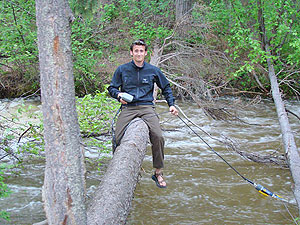Sampling the Yukon on a 1,500-mile canoe journey
Sampling the Yukon on a 1,500-mile canoe journey
Submitted by Ned Rozell
Phone: (907) 474-7468
08/02/07


As a half-dozen canoeists paddle down the Yukon River on what they call a healing journey, they tow behind them a water-quality probe to check the health of Alaska’s largest waterway.
Jon Waterhouse is a member of a six-person team that began boating from the village of Moosehide, near Dawson City in the Yukon, on June 22, 2007. The team will continue to the village of St. Marys in Alaska, about 1,500 miles down river. Waterhouse is assistant director of the Yukon River Inter-Tribal Watershed Council and is manning the stern of a canoe that pulls a torpedo-like water-quality probe through the silt-brown water of the Yukon. The instrument weighs about 15 pounds.
"It’s like towing a boat anchor," Waterhouse said. "We go about a mile per hour slower than the other canoes. When they’re coasting, we have to paddle."
Matt Hage, Agnes Stowe, Danielle Pratt, David Pelunis-Messier, and Kevin Solomon from Fort Yukon are in three other canoes. Bryan Maracle, Karin Williams, Brian Hirsch, and Diana Wilmar also have paddled stretches of the river with the group.
"The Yukon River Healing Journey" started in Canada and the boaters plan on reaching St. Marys by Aug. 9 to be there for the Yukon River Inter-Tribal Watershed Council Summit. The council includes members of 65 tribes and first nations who live along the Yukon River in Canada and Alaska.
The main reasons for the journey are to promote environmental awareness and to celebrate cultural ties as the boaters stop at every village along the way. Waterhouse and others also see the trip as an opportunity to supplement the group’s water-quality monitoring program by profiling the length of the river as they paddle. The company YSI sponsored them with a top-of-the-line water-quality probe, which they tow like a fishing lure from the back of a canoe. The paddlers download data every night and reactivate the probe every morning.
"What they’re doing has never been done before," said Paul Schuster, a hydrologist for the U.S. Geological Survey’s National Research Program in Boulder, Colo. Schuster has been a consultant to the Yukon watershed council for the last three years. "No one has ever measured continuous basic water quality parameters for the whole length of the Yukon River."
The probe samples the river every 30 minutes for water temperature, dissolved oxygen, Ph, and nutrients, such as nitrates and nitrites. Waterhouse said the instrument works best behind a canoe; motorboats tend to contaminate readings with the exhaust and turbulence from their propellers.
Schuster said he is interested to see if the probe can pick up the changes in the river as it flows through areas with different geology and vegetation and also human-caused changes from larger villages, such as Galena.
"If the river chemistry changes as it moves through different ecologic regimes, we should be able to see it in the data set," he said.
The instrument is performing well, according to Waterhouse. He thinks the group will get meaningful scientific information.
"I’m hoping we’ll get a good benchmark out of this trip," Waterhouse added. "If we don’t know what the river’s like now, how do we know what’s happening in the future?"
Schuster has spent months on the Yukon and has sampled many great waterways, including the Colorado River and the Everglades. He says the Yukon is a hydrologist’s dream.
"It’s quite possibly the last great uncontrolled river in the world, with no dams or levees," said Schuster, who along with his USGS colleagues just completed a five-year study on the Yukon. "Compared to the other large rivers, the Yukon is relatively pristine, but future changes in climate and land use could change that. That’s why it’s so important to do these baseline studies."
Alaska Science Forum is provided as a public service by the Geophysical Institute, University of Alaska Fairbanks, in cooperation with the UAF research community. Ned Rozell is a science writer at the institute. To view past columns or to subscribe, visit www.gi.alaska.edu/ScienceForum/index.html.


